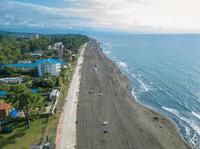Georgia, a country graced by the Black Sea, presents a unique climatic diversity along its coastlines. This detailed exploration focuses on the variations in climate across different beaches, highlighting how these variations influence the beach experience in this region.
Overview of Georgia's Black Sea Climate
The Black Sea coastline of Georgia experiences a predominantly humid subtropical climate. Summers are warm and winters mild, influenced by the sea's vast expanse. The coastal region's climate stands in contrast to the inland areas, where the climate is more continental and arid. For instance, in Tbilisi, situated away from the coast, the climate is more continental compared to the coastal areas, with less precipitation and more temperature extremes.
Seasonal Climate Variations Along the Coast
The seasonal variation along Georgia's Black Sea coast is marked by warm summers and relatively mild winters. Summer temperatures can rise significantly, with averages around 29°C (84°F) in places like Batumi. Winters, while cooler, rarely reach freezing points, maintaining a mild profile conducive for off-season beach activities.
Precipitation Patterns
The precipitation along the coast varies. In cities like Kutaisi, close to the coast, annual rainfall averages 1,450 mm (57 inches), with no pronounced dry season. This consistent rainfall contributes to the lush greenery and rich biodiversity of the coastal regions, significantly impacting the beach environment.
Beach-Specific Climate Characteristics
Batumi:
Batumi's climate is tempered by the Black Sea, leading to mild winters and warm, humid summers. This makes Batumi's beaches favorable for year-round visits, with the warm season extending from June to September.
Kvariati and Gonio:
These beaches, closer to the Turkish border, share a similar climate pattern with Batumi, experiencing warm and humid summers. However, their proximity to the mountainous regions can result in slightly cooler temperatures, especially during the night.
Shekvetili and Ureki:
Located further north along the coast, these beaches experience slightly cooler temperatures, particularly in the transitional seasons of spring and autumn. Their unique sand composition also influences the microclimate, making the beach experience distinct from the southern beaches.
Impact of Climate on Beach Ecology
The climate along Georgia's Black Sea coast directly impacts the ecology of its beaches. The consistent rainfall supports diverse plant and animal life, while the temperature variations influence the migratory patterns of marine life. This ecological richness enhances the beach experience, offering visitors a glimpse into the region's natural beauty.
Conclusion: The Dynamic Climate of Georgian Beaches
Georgia's Black Sea coastline presents a dynamic climatic landscape. From the warm, humid summers of Batumi to the cooler, breezy evenings of Shekvetili, the climate variation across these beaches shapes the unique experiences they offer. Understanding these variations is key to appreciating the natural beauty and ecological diversity of Georgia's coastal regions.

 Batumi
Batumi
 Kvariati
Kvariati
 Gonio
Gonio
 Ureki
Ureki
 Sun-Kissed Shores
Sun-Kissed Shores
 Characteristics of the Black Sea Coastline
Characteristics of the Black Sea Coastline
 Sand and Pebble Beach Profiles
Sand and Pebble Beach Profiles




